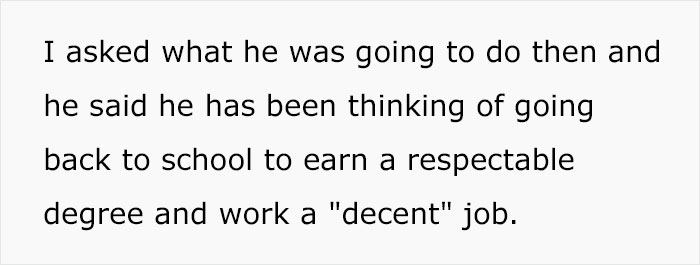
“Am I The Jerk For Refusing To Give My Husband My New WiFi Password?”
Once you lose someone’s trust, it can be very hard — or even impossible — to get it back. And it looks like Reddit user Sandy20994’s (who, for the sake of this article, we’ll call simply Sandy) husband may have crossed this line.
A couple of days ago, the woman submitted a post to the platform’s ‘Am I the [Jerk]?‘ community, asking if she was in the wrong to cut him off of their WiFi, but as her story went viral, more and more people began suggesting their relationship has much, much bigger problems.
The internet dispute, they believe, is just the tip of the iceberg, and a better place to start would be the months of lying—Sandy’s husband told her he got fired, but months later, she learned that he actually quit on his own.
Continue scrolling to read what the woman revealed about her marriage and let us know what you think of it in the comments.
After this woman confronted her husband about their ballooning internet bill, she uncovered details about his past she didn’t even know about
Image credits: Timur Weber (not the actual photo)
So she asked the internet if she overreacted by changing the WiFi password
Image credits: Porapak Apichodilok (not the actual photo)
People unanimously said the woman wasn’t being a jerk, and many of those who shared their take on the situation added that she should probably reevaluate her marriage altogether. Mainly due to her husband’s dishonesty.
There might be some truth to their words. Even though we all tell white lies like “I’m fine,” when we’re not and compliment unwanted gifts, as Darlene Lancer, a licensed marriage and family therapist who has treated individuals and couples for 30 years, points out, in an intimate relationship, emotional honesty is a must.
“Honesty is more than simply not lying,” Lancer writes in Psychology Today. “Deception includes making ambiguous or vague statements, telling half-truths, manipulating information through emphasis, exaggeration, or minimization, and withholding feelings or information that is important to someone who has a right to know, because it affects the relationship and deprives that person of freedom of choice and informed action.”
Although we may consider ourselves honest, the therapist believes few of us reveal all our negative thoughts and feelings about the people we are close to since it requires real courage to be vulnerable and authentic.
Lancer says what, when, why, and how we disclose are all essential factors. “The timing, impact, and our motives should be carefully considered. Full disclosure may be necessary to rebuild a broken marriage. Studies also show that people who have good self-esteem and a high opinion of their partner are more likely to forgive him or her. However, what are the compelling reasons to reveal an affair that’s long over or a current one that we have no intention of ending? In the first case, is it to deepen mutual intimacy? In the latter, is it to avoid it or provoke a divorce that we’re afraid to initiate? Disclosing our dissatisfaction in the relationship might be the necessary conversation that, if communicated earlier, would have prevented the affair.”
For everyone involved, the pain of the secrecy compounds the pain over the initial event, and the longer the deception continues, the more damaging it is to self-esteem. Ideally, before revealing the truth to the person we’ve lied to, it’s helpful to have accepted our mistakes; otherwise, our shame and guilt can be obstacles to genuine empathy for the person we’ve harmed. First, talk to someone nonjudgmental whom you trust, or seek counseling. If we’ve forgiven ourselves, we’re in a better position to answer questions and face the anger and hurt feelings that we’ve caused.
“When the truth comes out, often it’s enlightening. It can help the other person make sense of previously unexplained or confusing behavior. At the same time, it can be devastating and traumatic to discover that the one we loved and trust has betrayed us,” Lancer explains. “It can shatter the image we have of our partner, as well as our confidence in ourselves and even reality itself.”
Unfortunately, by thinking she was in the wrong, the author of the WiFi story proved what’s often the sad part when it comes to victims of betrayal. They frequently blame themselves.
“If the relationship wasn’t working, both partners have a responsibility to speak up and address problems. Although it may be fruitful to examine our behavior in order to learn from it, we’re never responsible for someone else’s actions or omissions,” Lancer adds.
Let’s hope that Sandy will figure things out.
Here’s what people said after learning what happened
337Kviews
Share on FacebookExplore more of these tags
When you have to dicipline your husband like you would your teenage kid, maybe it's time to find an adult as a partner
I would like to say as a teen myself most of the ones I know don't act like that.
Load More Replies...Yes, another post that sadly reads more like it would be on a parenting forum 😔
If they live in a rural area it may be limited. My brother does and they have to limit their internet usage.
Load More Replies...When you have to dicipline your husband like you would your teenage kid, maybe it's time to find an adult as a partner
I would like to say as a teen myself most of the ones I know don't act like that.
Load More Replies...Yes, another post that sadly reads more like it would be on a parenting forum 😔
If they live in a rural area it may be limited. My brother does and they have to limit their internet usage.
Load More Replies...
 Dark Mode
Dark Mode 

 No fees, cancel anytime
No fees, cancel anytime 










































































74
127